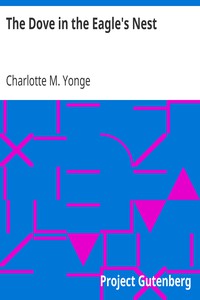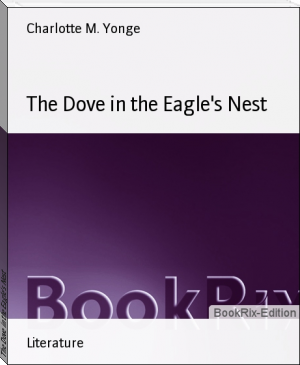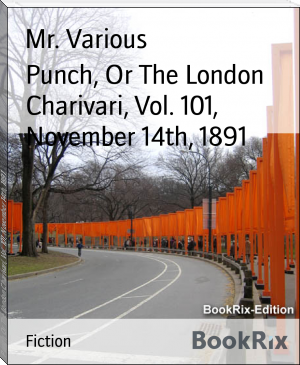The Dove in the Eagle's Nest, Charlotte M. Yonge [i want to read a book txt] 📗

- Author: Charlotte M. Yonge
Book online «The Dove in the Eagle's Nest, Charlotte M. Yonge [i want to read a book txt] 📗». Author Charlotte M. Yonge
“Ah!” said Eberhard with a long breath, after having listened with a hunter’s keen interest to this hair’s-breadth escape, “it sounds like a gust of my mountain air thus let in on me.”
“Truly it is dismal work for a lusty hunter to lie here,” said Theurdank, “but soon shalt thou take thy crags again in full vigour, I hope. How call’st thou the deep gray lonely pool under a steep frowning crag sharpened well-nigh to a spear point, that I passed yester afternoon?”
“The Ptarmigan’s Mere, the Red Eyrie,” murmured Ebbo, scarcely able to utter the words as he thought of Friedel’s delight in the pool, his exploit at the eyrie, and the gay bargain made in the streets of Ulm, that he should show the scaler of the Dom steeple the way to the eagle’s nest.
“I remember,” said his guest gravely, coming to his side. “Ah, boy! thy brother’s flight has been higher yet. Weep freely; fear me not. Do I not know what it is, when those who were over-good for earth have found their eagle’s wings, and left us here?”
Ebbo gazed up through his tears into the noble, mournful face that was bent kindly over him. “I will not seek to comfort thee by counselling thee to forget,” said Theurdank. “I was scarce thine elder when my life was thus rent asunder, and to hoar hairs, nay, to the grave itself, will she be my glory and my sorrow. Never owned I brother, but I trow ye two were one in no common sort.”
“Such brothers as we saw at Ulm were little like us,” returned Ebbo, from the bottom of his heart. “We were knit together so that all will begin with me as if it were the left hand remaining alone to do it! I am glad that my old life may not even in shadow be renewed till after I have gone in quest of my father.”
“Be not over hasty in that quest,” said the guest, “or the infidels may chance to gain two Freiherren instead of one. Hast any designs?”
Ebbo explained that he thought of making his way to Genoa to consult the merchant Gian Battista dei Battiste, whose description of the captive German noble had so strongly impressed Friedel. Ebbo knew the difference between Turks and Moors, but Friedel’s impulse guided him, and he further thought that at Genoa he should learn the way to deal with either variety of infidel. Theurdank thought this a prudent course, since the Genoese had dealings both at Tripoli and Constantinople; and, moreover, the transfer was not impossible, since the two different hordes of Moslems trafficked among themselves when either had made an unusually successful razzia.
“Shame,” he broke out, “that these Eastern locusts, these ravening hounds, should prey unmolested on the fairest lands of the earth, and our German nobles lie here like swine, grunting and squealing over the plunder they grub up from one another, deaf to any summons from heaven or earth! Did not Heaven’s own voice speak in thunder this last year, even in November, hurling the mighty thunderbolt of Alsace, an ell long, weighing two hundred and fifteen pounds? Did I not cause it to be hung up in the church of Encisheim, as a witness and warning of the plagues that hang over us? But no, nothing will quicken them from their sloth and drunkenness till the foe are at their doors; and, if a man arise of different mould, with some heart for the knightly, the good, and the true, then they kill him for me! But thou, Adlerstein, this pious quest over, thou wilt return to me. Thou hast head to think and heart to feel for the shame and woe of this misguided land.”
“I trust so, my lord,” said Ebbo. “Truly, I have suffered bitterly for pursuing my own quarrel rather than the crusade.”
“I meant not thee,” said Theurdank, kindly. “Thy bridge is a benefit to me, as much as, or more than, ever it can be to thee. Dost know Italian? There is something of Italy in thine eye.”
“My mother’s mother was Italian, my lord; but she died so early that her language has not descended to my mother or myself.”
“Thou shouldst learn it. It will be pastime while thou art bed-fast, and serve thee well in dealing with the Moslem. Moreover, I may have work for thee in Welschland. Books? I will send thee books. There is the whole chronicle of Karl the Great, and all his Palsgrafen, by Pulci and Boiardo, a brave Count and gentleman himself, governor of Reggio, and worthy to sing of deeds of arms; so choice, too, as to the names of his heroes, that they say he caused his church bells to be rung when he had found one for Rodomonte, his infidel Hector. He has shown up Roland as a love-sick knight, though, which is out of all accord with Archbishop Turpin. Wilt have him?”
“When we were together, we used to love tales of chivalry.”
“Ah! Or wilt have the stern old Ghibelline Florentine, who explored the three realms of the departed? Deep lore, and well-nigh unsearchable, is his; but I love him for the sake of his Beatrice, who guided him. May we find such guides in our day!”
“I have heard of him,” said Ebbo. “If he will tell me where my Friedel walks in light, then, my lord, I would read him with all my heart.”
“Or wouldst thou have rare Franciscus Petrarca? I wot thou art too young as yet for the yearnings of his sonnets, but their voice is sweet to the bereft heart.”
And he murmured over, in their melodious Italian flow, the lines on Laura’s death:—
“Not pallid, but yet whiter than the snow
By wind unstirred that on a hillside lies;
Rest seemed as on a weary frame to grow,
A gentle slumber pressed her lovely eyes.”
“Ah!” he added aloud to himself, “it is ever to me as though the poet had watched in that chamber at Ghent.”
Such were the discourses of that morning, now on poetry and book lore; now admiration of the carvings that decked the room; now talk on grand architectural designs, or improvements in fire-arms, or the discussion of hunting adventures. There seemed nothing in art, life, or learning in which the versatile mind of Theurdank was not at home, or that did not end in some strange personal reminiscence of his own. All was so kind, so gracious, and brilliant, that at first the interview was full of wondering delight to Ebbo, but latterly it became very fatiguing from the strain of attention, above all towards a guest who evidently knew that he was known, while not permitting such recognition to be avowed. Ebbo began to long for an interruption, but, though he could see by the lightened sky that the weather had cleared up, it would have been impossible to have suggested to any guest that the way might now probably be open, and more especially to such a guest as this. Considerate as his visitor had been the night before, the pleasure of talk seemed to have done away with the remembrance of his host’s weakness, till Ebbo so flagged that at last he was scarcely alive to more than the continued sound of the voice, and all the pain that for a while had been in abeyance seemed to have mastered him; but his guest, half reading his books, half discoursing, seemed too much immersed in his own plans, theories, and adventures, to mark the condition of his auditor.
Interruption came at last, however. There was a sudden knock at the door at noon, and with scant ceremony Heinz entered, followed by three other of the men-at-arms, fully equipped.
“Ha! what means this?” demanded Ebbo.
“Peace, Sir Baron,” said Heinz, advancing so as to place his large person between Ebbo’s bed and the strange hunter. “You know nothing of it. We are not going to lose you as well as your brother, and we mean to see how this knight likes to serve as a hostage instead of opening the gates as a traitor spy. On him, Koppel! it is thy right.”
“Hands off! at your peril, villains!” exclaimed Ebbo, sitting up, and speaking in the steady resolute voice that had so early rendered him thoroughly their master, but much perplexed and dismayed, and entirely unassisted by Theurdank, who stood looking on with almost a smile, as if diverted by his predicament.
“By your leave, Herr Freiherr,” said Heinz, putting his hand on his shoulder, “this is no concern of yours. While you cannot guard yourself or my lady, it is our part to do so. I tell you his minions are on their way to surprise the castle.”
Even as Heinz spoke, Christina came panting into the room, and, hurrying to her son’s side, said, “Sir Count, is this just, is this honourable, thus to return my son’s welcome, in his helpless condition?”
“Mother, are you likewise distracted?” exclaimed Ebbo. “What is all this madness?”
“Alas, my son, it is no frenzy! There are armed men coming up the Eagle’s Stairs on the one hand and by the Gemsbock’s Pass on the other!”
“But not a hair of your head shall they hurt, lady,” said Heinz. “This fellow’s limbs shall be thrown to them over the battlements. On, Koppel!”
“Off, Koppel!” thundered Ebbo. “Would you brand me with shame for ever? Were he all the Schlangenwalds in one, he should go as freely as he came; but he is no more Schlangenwald than I am.”
“He has deceived you, my lord,” said Heinz. “My lady’s own letter to Schlangenwald was in his chamber. ’Tis a treacherous disguise.”
“Fool that thou art!” said Ebbo. “I know this gentleman well. I knew him at Ulm. Those who meet him here mean me no ill. Open the gates and receive them honourably! Mother, mother, trust me, all is well. I know what I am saying.”
The men looked one upon another. Christina wrung her hands, uncertain whether her son were not under some strange fatal deception.
“My lord has his fancies,” growled Koppel. “I’ll not be balked of my right of vengeance for his scruples! Will he swear that this fellow is what he calls himself?”
“I swear,” said Ebbo, slowly, “that he is a true loyal knight, well known to me.”
“Swear it distinctly, Sir Baron,” said Heinz. “We have all too deep a debt of vengeance to let off any one who comes here lurking in the interest of our foe. Swear that this is Theurdank, or we send his head to greet his friends.”
Drops stood on Ebbo’s brow, and his breath laboured as he felt his senses reeling, and his powers of defence for his guest failing him. Even should the stranger confess his name, the people of the castle might not believe him; and here he stood like one indifferent, evidently measuring how far his young host would go in his cause.
“I cannot swear that his real name is Theurdank,” said Ebbo, rallying his forces, “but this I swear, that he is neither friend nor fosterer of Schlangenwald, that I know him, and I had rather die than that the slightest indignity were offered him.” Here, and with a great effort that terribly wrenched his wounded leg, he reached past Heinz, and grasped his guest’s hand, pulling him as near as he could.
“Sir,” he said, “if they try to lay hands on you, strike my death-blow!”
A bugle-horn was wound outside. The men stood daunted—Christina in extreme terror for her son, who lay gasping, breathless, but still clutching the stranger’s hand, and with eyes of fire glaring on the mutinous warriors. Another bugle-blast! Heinz was almost in the act of grappling with the silent foe, and Koppel cried as he raised his halbert, “Now or never!” but paused.
“Never, so please you,” said the strange guest. “What if your young lord could not forswear himself that my name is Theurdank! Are you foes to all the world save Theurdank?”
“No masking,” said Heinz, sternly. “Tell your true name as an honest man, and we will judge whether you be friend or foe.”
“My name is a mouthful, as your master knows,” said the guest, slowly, looking with strangely amused eyes on the confused lanzknechts, who were trying to devour their rage. “I was baptized Maximilianus; Archduke of Austria, by birth; by choice of the Germans, King of the Romans.”
“The Kaisar!”
Christina dropped on her knee; the men-at-arms tumbled backwards; Ebbo pressed the hand he held to his lips, and fainted away. The bugle sounded for the third





Comments (0)